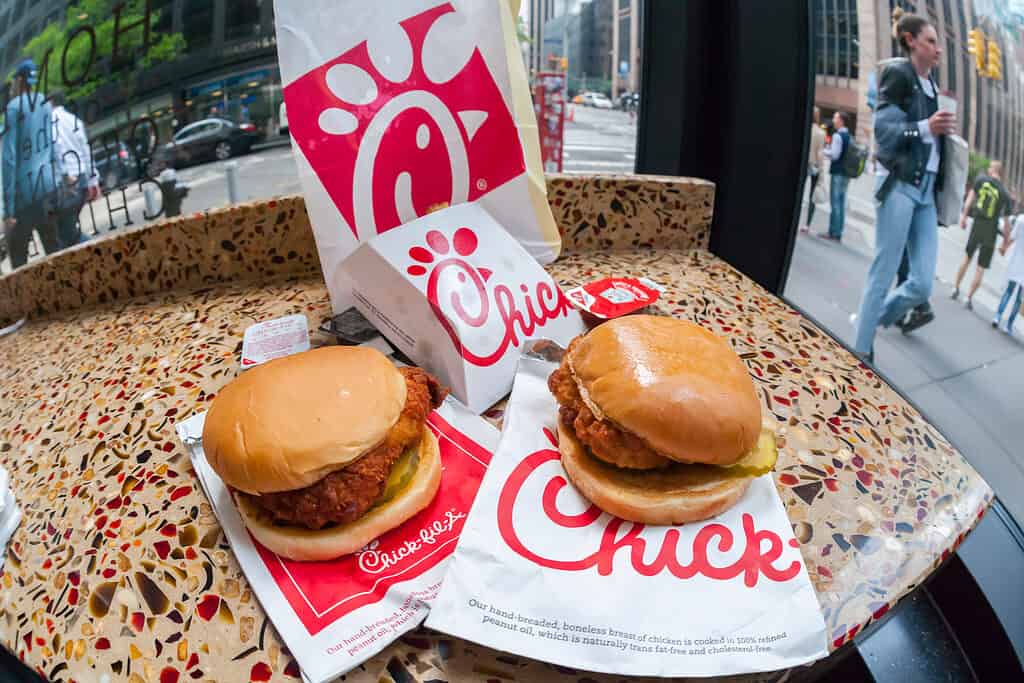A Chick-fil-A franchise is relatively cheap to own, requiring a modest $10,000 investment. However, that doesn’t mean anyone with a spare $10k can own a Chick-fil-A. Nor does it mean that’s how much a Chick-fil-A costs to build. The Chick-fil-A corporate office invests a lot in each location, and they’re extremely selective with their franchisees. Each owner has to be a skilled leader and savvy entrepreneur.
And there’s no doubt that Chick-fil-A’s lengthy selection process weeds out anyone who isn’t up to par. If you’re wondering, “how much is a Chick-fil-A franchise?” you’ll want to read on. We’ll break down all the costs associated with opening a Chick-fil-A, explain each, and lay out what it takes to be a franchise owner.

All About Chick-fil-A
Restaurateur and entrepreneur Truett Cathy created the first Chick-fil-A sandwich in 1964, pairing fried chicken with two pickles and a toasted butter bun. Local food court guests met the new sandwich with rave reviews, and it quickly gained popularity.
In 1986, Chick-fil-A opened its first stand-alone restaurant. From those relatively modest beginnings, the company has grown to become the largest quick-serve chicken restaurant chain in the United States. More than that, the brand dominates the entire fast food scene, despite the company taking a rather unique approach to its operations.
Unlike other profit-driven fast food chains, Chick-fil-A is closed on Sundays, a major day for fast food sales. What’s more, the restaurant pays employees well above the national average.
Cathy, who passed away in 2014, believed he was in the people business, not the food business. He was also a devout Christian. Because of his religious convictions, Cathy believed in taking care of employees and keeping Sundays holy. He also thought Chick-fil-A restaurants should serve their communities, leading to several corporate-sponsored give-back programs.
Those guiding principles remain intact in every Chick-fil-A franchise location and are part of what makes the chain so successful.
Franchise Cost Breakdown
The initial investment for a Chick-fil-A franchisee comes in at about $10,000, or $15,000 for franchises operating in Canada. Once that threshold is met, the company will cover the rest of the initial expenses, which could exceed $2 million in some cases! The breakdown looks like this:
- Initial Franchise Fee: $10,000
- Initial Inventory: $19,000 to $93,000
- 1st Month Equipment Rental: $750 to $5,000
- 1st Month Lease: $2,500 to $85,000+
- 1st Month Insurance: $310 to $11,500
- Additional Funds: $186,493 to $2,700,000
The franchisee must pay back the initial expenses from gross receipts after opening, minus the original franchise fee. After the franchisee pays everything back, they become the owner in full and can open additional franchises at a reduced $5,000 initial fee.
Ongoing Franchise Fees
Of course, initial fees aren’t the only thing to be aware of as a franchise owner. Chick-fil-A pays for each restaurant’s land, construction, and equipment. Then, it leases the property to the franchisee for 15% of sales plus 50% of pretax profit.
You’ll also have to lease necessary software and high-speed internet access from Chick-fil-A at $9,500 to $20,000 per year.
Moreover, Chick-fil-A retains the right to charge an advertising fee of up to 3.25%. The last time they charged this fee was 1989, but it’s crucial to know that they could reinstate it at any point.
If a franchisee is late on their payments to Chick-fil-A, they’ll incur a 1.25% interest fee.
What It Takes To Open a Chick-fil-A
Becoming a Chick-fil-A franchisee isn’t as easy as throwing down $10.000 and saying, “I want in!” Indeed, Chick-fil-A is extremely picky about who becomes a member of their restaurant family, and they vet each prospective owner thoroughly.
In fact, Chick-fil-A is more selective than Ivy League colleges like Harvard and Yale. While schools like these let in 5% and 4.46% of applicants, respectively, Chick-fil-A only allows .04% of applicants to become franchisees.
The Application Process
The journey of a franchise owner begins with a tiered application process. At this stage, you’ll share your employment history and leadership qualifications. You’ll also provide information surrounding your financial health.
During your initial application, you’ll need to list your preferred geographic location for opening a Chick-fil-A. It’s crucial to have a personal connection as one of Chick-fil-A’s driving values is being community-focused.
It’s also important to note that Chick-fil-A prioritizes applications by the need of growth markets. So, if you want to open a restaurant in a small town with little demand for a new franchise, you might find it takes the company a long time to get back to you.
Once you complete the application process, Chick-fil-A may invite you for a few in-person and virtual interviews. If you complete those and get through to the final selection, you’ll be sent to a multi-week training program preparing you to own and operate a Chick-fil-A.
Chick-fil-A organizes in-person or virtual information events, which can be informative and valuable for anyone interested in applying for a franchise. The chain also recommends that prospective franchisees familiarize themselves with the company’s values and history.
You can learn a lot from the Chick-fil-A website alone, but the founder, Truett Cathy, also wrote six books. Reading them will provide insight into the company’s core beliefs and help prospective franchisees determine whether or not they’re a good fit for the brand.
Is Opening a Chick-fil-A Franchise Profitable?
Yes, opening a Chick-fil-A is a highly profitable endeavor for most franchisees. Franchisor retained earnings reached $1.25 billion in 2021, compared to $670 million in 2019.
Not only is that a huge amount of retained earnings, but it also shows massive growth in recent years. To further illustrate the point, Chick-fil-A has seen a 56% revenue increase over a five-year period at non-mall locations.
Of course, with the company’s increasing popularity comes increasing competition. New chicken restaurant concepts are popping up right and left. Restaurants like Guy Fieri’s Chicken Guy and Dave’s Hot Chicken (which boasts NBA star Kris Humphries as an investor) are bound to be tough competition for Chick-fil-A.
Moreover, there are also tried and true fast food giants, like KFC, Popeye’s, and McDonald’s, that Chick-fil-A has to compete with.
The “Chicken Sandwich Wars,” which started between Chick-fil-A and Popeye’s in 2019, is just one example of how hot the chicken industry is today and how much feuding there is for market share.
That might sound intense, but the competition and pursuit of dominance in the fast food industry drive companies to actively pursue sales. For a franchisee, it represents an opportunity for profits and success.
So, How Much Is a Chick-fil-A Franchise?
The answer to the question, “how much is a Chick-fil-A franchise” might appear simple on the surface. A relatively modest $10,000 investment is technically all you need financially. However, the franchisee vetting process is lengthy, and only the best fits make it through to join the company.
It’s also important to know that Chick-fil-A may spend as much as $2 million or more investing in each franchise. As a franchise owner, you’re responsible for paying that back after your restaurant opens. That said, Chick-fil-A franchises are typically profitable with the right management, making a franchise desirable to own.



















